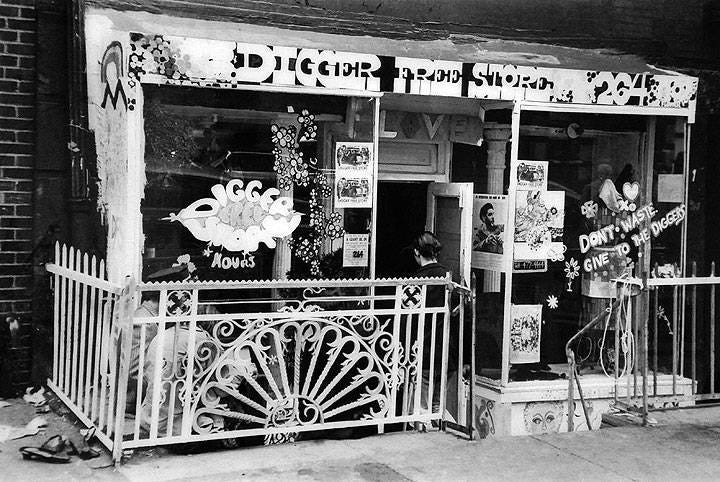Diggers And The Free Stores
The Diggers, comprising artists, actors, and political activists, were deeply influenced by the principles of anarchism, existentialism, and the burgeoning hippy movement's ideals of peace and love.
In the heart of 1967, amidst the vibrant uprising of counterculture that defined the era, a group of activists in San Francisco embarked on a radical experiment that aimed to challenge the very foundations of American capitalism and consumer culture. Known as the Diggers, after the English agrarian socialists of the 17th century who advocated for common land rights, these modern-day visionaries sought to promote a money-free economy and communal living as the cornerstone of their philosophy. Their mission was simple yet revolutionary: to create a society where the value of goods and services was not determined by money, but by the needs and contributions of the community.
The Diggers, comprising artists, actors, and political activists, were deeply influenced by the principles of anarchism, existentialism, and the burgeoning hippy movement's ideals of peace and love. They viewed San Francisco, particularly the Haight-Ashbury district, as the epicenter of a cultural revolution that could spread across the nation, transforming society in its wake.
One of their most iconic initiatives was the opening of Free Stores. The concept was as radical as it was straightforward: a store where everything was available for free. The first of these stores, simply named the Free Store, appeared in the Haight-Ashbury district, a beacon of the Diggers' utopian vision. The storefront bore no sign, but the message was clear to all who entered: "Take what you need. Give what you can."
Inside the Free Store, the conventions of retail commerce were turned on their head. Shelves and bins were filled with clothes, books, food, and household items, all donated by members of the community or salvaged from excesses of consumer society. Volunteers ran the store, but there were no cashiers, no price tags, and no expectations of monetary exchange. Instead, the Diggers encouraged patrons to contribute in any way they felt appropriate, whether by donating goods, offering their skills and time, or simply by participating in the communal spirit of the endeavor.
The Free Stores served as more than just a place to find material goods; they were community hubs where people met, exchanged ideas, and forged connections. Workshops, free meals, and street theater performances became regular events organized by the Diggers, each activity reinforcing their message of communal care and mutual aid.
Beyond the practical implications of providing free goods and services, the Free Stores embodied a direct challenge to the capitalist system. They posed fundamental questions about the nature of value, ownership, and the possibility of an economy based on generosity and abundance rather than scarcity and competition. In doing so, the Diggers' actions went beyond mere protest; they were an attempt to live out the ideals of the society they wished to create.
The impact of the Diggers and their Free Stores rippled through the counterculture movement and beyond. While the experiment was not without its challenges, including legal hurdles and internal disputes, the legacy of the Diggers' bold vision endures. Their efforts prefigured later movements that sought to address issues of economic inequality, sustainability, and community solidarity.
As the sun set on the Summer of Love, the Diggers continued to evolve, eventually dispersing as the political and social tides of America shifted. Yet, the story of the Free Stores remains a poignant chapter in the annals of American activism, a reminder of a moment when a group of idealistic individuals dared to reimagine society and, in doing so, showed that another world was possible, if only for a brief, shining moment.
